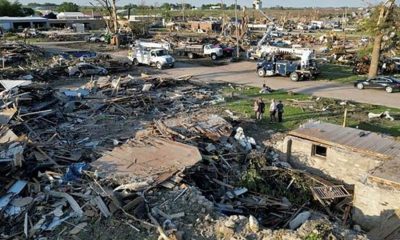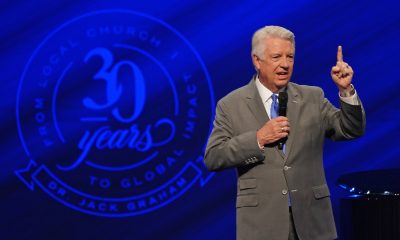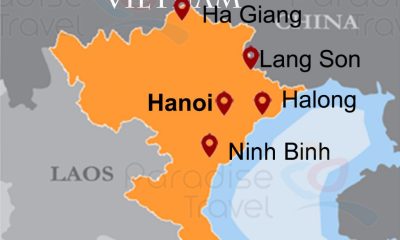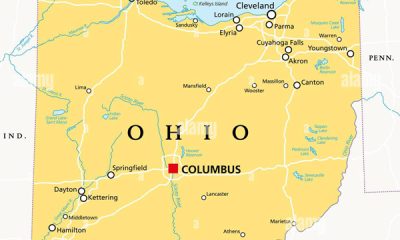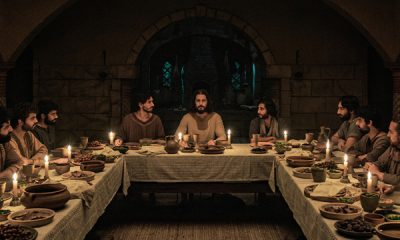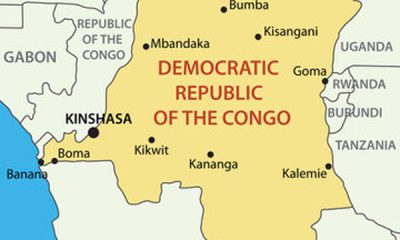world news
Ministry that led over 66K people to Christ will hold first US crusade
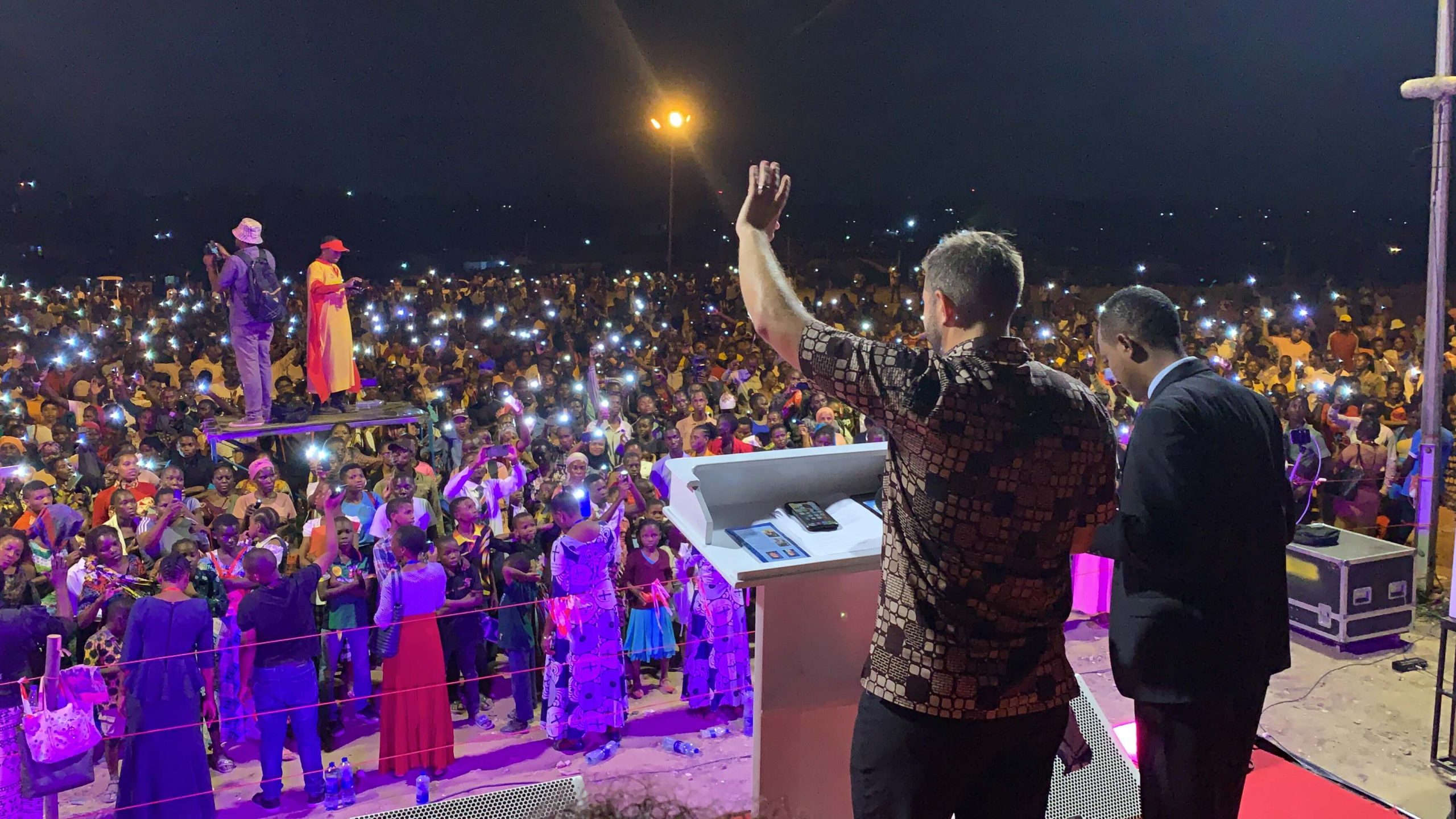
An evangelism group that recently held events in West Africa and South America that resulted in over a reported 66,000 decisions for Christ is planning to hold its first-ever crusade in the United States.
World Harvest Global, an outreach organization headquartered in Grand Prairie, Texas, which earlier this year held events in Guinea-Bissau, Zambia and Peru, is planning to hold its first U.S.-based gathering in South Carolina next year.
Jacob Ebersole, founder and president of World Harvest, told The Christian Post in an interview that his organization has been planning to hold the upstate South Carolina event for over two years.
“The team already formed for this is pretty significant,” said Ebersole. “In Jesus’ name, we’re going to see a move of God start there that will spread through the whole state of South Carolina. What happens beyond that, I’ll leave up to the Lord.”
Ebersole hopes the event next year will “reach the whole nation” through their social media strategy.
He says his ministry is “trying to walk through the lens of 1 Corinthians 13” in their evangelism events.
“You can move mountains, speak with the tongues of angels, but if you have not love, you have nothing,” he said, paraphrasing the biblical passage. “We really care about this at every level.”
“We try to make sure we do everything with excellence, and I think what’s happening is people are starting to notice, and they want to be a part of it. And so, our team is growing, and now it’s like, people from all around the world that are coming on board to be a part of what God is doing through World Harvest.”
A Muslim-majority nation located in West Africa, World Harvest held a series of crusade events in Guinea-Bissau’s capital city Bissau and the city of Gabu in late March and early April.
According to Ebersole, the country has seen a recent rise in its Islamic population. When pastors living in the nation reached out to World Harvest, it was considered “an emergency call.”
“They were like, ‘if we don’t move now, it’s going to be a Muslim state, and they are taking over quickly,'” Ebersole told CP. “And so, we met with the right people, formed our board of advisors there, in the capital city.”
“The bishops and the pastors that I was dealing with literally saw this as their last shot to take Guinea-Bissau back for Jesus.”
According to the Joshua Project, Muslims comprise just over half of Guinea-Bissau’s population, while Christian adherents comprise over 11%.
Ebersole, who has been organizing overseas evangelism events for the past couple of years, described the Guinea-Bissau event as “the most difficult campaign that I’ve ever had to go through.”
“The spiritual warfare in that almost ripped the team apart, almost ripped me apart,” he said. “But thank the Lord; He was faithful every step of the way. After about a year of plowing and getting doors shut left and right, we finally locked in the location.”
One thing helping their efforts was young people, he said, as there had been a revival before the first in-person World Harvest events. Thousands of youth showed up for worship at the field reserved for the crusade event.
According to Ebersole, the “worship and prayer on the crusade field” mutated into large crowds of mostly young people “taking the streets” in worship and even marching to the local airport.
“They could have pulled our permits, but what happened was we made so much noise in the city that it got all the way up to the president of Guinea-Bissau, and he wanted to meet us,” Ebersole said.
World Harvest leaders eventually met with Muslim President Umaro Sissoco Embaló for an hour, Ebersole recalled, with the national leader helping them get some of their equipment into the country after it was stuck at the border.
“We had just enough time to set up for the crusade that took place the next day. It was time to begin, and they were raising up the speakers and raising up the screens. So, just in the nick of time. And then, he showed up to the first day of the campaign,” said Ebersole.
“There was joy in the city. And I don’t think they had seen that before. It wasn’t like it was this aggressive, ‘we’re punching you in the face with Jesus’ thing. It was joy in the streets, and it was young people, and I was in tears just watching them do this week after week.”
After holding events in the capital city, World Harvest went to Gabu, a town described by Ebersole as “a Muslim stronghold” and the “most dangerous, dark territory in the nation.”
According to the World Harvest leader, hundreds of Guinea-Bissau youth volunteered to travel there, with impromptu worship and evangelism taking place in the city.
A local Youth With a Mission chapter supported the Gabu mission, with around 100 youth staying at their facility during the crusade.
Ebersole told CP that the Gabu crusade was “a God thing” that “had nothing to do with us” but rather was a matter of “just faith and guts.”
Ebersole says that a little under 18,500 people came to Christ during their two crusades, not including the thousands saved through other initiatives within the West African nation.
David Hoffman, the director of Kingdom Enterprises, an outreach and evangelism ministry in Tucson, Arizona, who has recently come to know Ebersole, told CP that he was impressed by the outpouring of faith in Guinea-Bissau.
Hoffman saw videos of the youth marching posted online, telling CP that he “heard them all singing and praising God” and felt that “this is something unique because where do you see this happening?”
Hoffman was also impressed with how World Harvest “did back-to-back Gospel campaigns,” which he found “pretty incredible” because it is “hard to just go boom, boom, boom, from thing to thing” with evangelism events.
“I thought, wow, this is really legitimate. This is something where God is really moving,” said Hoffman to CP. “I was just blown away seeing some of the things that God was doing.”
Zambia
Later in April, World Harvest held a crusade event in Zambia, a nation in Southern Africa located approximately 3,400 miles southeast of Guinea-Bissau.
The evangelism group held gatherings at the capital Lusaka, a city that, according to Ebersole, is known for “gang activity [and] prostitution.”
“But the Church is on fire in Zambia,” Ebersole told CP, adding that “it was a lot easier” to organize the event and that it “was the biggest crowd I’d ever preached in front of.”
Ebersole described how, on each night that they held worship, large numbers of youth came forward to not only accept Jesus as their Lord but also to get rid of past vices.
“I saw maybe thousands of young people coming forward and laying down their idols, addictions, condoms, booze, witchcraft, magic arts,” Ebersole recounted.
“So, we pulled stuff out of the barrels; I started to put it on the stage. And oftentimes, I had to turn around and ask the pastor what this was because they were bringing some weird stuff.”
Ebersole noted that while he “had seen stuff like this before on the crusade stage,” he had not seen such activity happen “to that extent,” stressing that “it was just a constant.”
“Everybody on the platform was freaking out. Going live on Facebook and Instagram and celebrating as these kids come in tears, and they got a needle in this hand and booze in this hand, and they’re shaking over the barrel, and they let it go,” he said.
“Zambia changed my life.”
According to Ebersole, there were approximately 45,000 people who made decisions for Christ during the April crusade event in Zambia.
Peru
In May, World Harvest held a crusade in Peru, marking the first time that the evangelism organization had overseen a campaign in South America, according to Ebersole.
The event was in San Juan de Lurigancho, a heavily populated district of Lima that is generally considered a dangerous part of the metropolitan area.
Ebersole told CP that his group “chose to have a crusade there for that reason” because it was known for having “a lot of prostitution, a lot of crime.”
Ebersole recalled that he “started weeping” when he looked “out at the hotel window” and saw “that crusade field fill up,” admitting that there are times when he does not understand how it is that his events can draw such large crowds.
“I still, to this day, don’t know why people come,” he said to CP. “It’s like, you don’t really know us; I don’t know why you come and listen; I don’t know why you sit for four hours.”
“It still boggles my mind today why people listen to the Gospel, and night after night, I’d say the crowd size almost doubled night after night in Peru.”
Hoffman commended the work of Ebersole and his team, telling CP that World Harvest does “more of a sobering Gospel call” meant to “only attract people that are seriously wanting to come to Christ, as opposed to just getting caught up in the emotion of it all.”
“They’re not just looking to have a ton of people come forward and say ‘all those people came,'” Hoffman explained. “They document how many people actually come up, and then they distribute those decision cards to churches to get churches involved in the follow-up.”
“Churches in Peru are starting to have new families coming, not people that have been going to church that just got a little more excited about it, but brand-new people popping into church and starting to come after the crusades.”
Ebersole told CP that in Peru, as with other crusade locations, they held a “Celebration Day” right after the evangelism event ended, which involved connecting local pastors with the people who made decisions for Christ.
“Before their hand comes down, they have a follow-up card in their hand, and there’s a counselor there that’s been trained for months to handle that responsibility. Those cards then get taken to a designated location, and they’re treated like gold,” Ebersole explained.
On the “Celebration Day,” they distribute the cards of people who made decisions for Christ to the pastors based on which part of the city they live in, with Ebersole saying that “We’re handing the fish over to the local church.”
“The key to it, though, is the work that we do with the Church leading up to the crusade,” Ebersole added. “So it’s six months of time with the pastors preparing them for this harvest and that’s really the follow-up system. We come in with the infrastructure, but it’s the heart cry that the pastors have to follow up with these people that we care about.”
According to Ebersole, there were a little under 3,500 decisions made in their Peru event, with one local pastor reporting that six new families had started attending his church because of the crusade.
Victory and pain
When thinking about the successes of his ministry outreach, Ebersole told CP that “all of this is blowing my mind,” adding that “being faithful in a little has turned into something that I have never anticipated.”
Ebersole said he came from a broken home and did not become a Christian until he was a teenager in 2006 when a pastor preached the Gospel to him outside a restaurant parking lot.
“Little by little, I started to realize that God was calling me to preach the Gospel to lost people the same way that that pastor did,” he said, saying that looking at his life trajectory “is still sort of freaking me out, a little bit.”
“So, in a strange way, I know as ministers, we preach from a place of victory, but I also simultaneously preach from a place of pain, remembering who I was then.”
Sources:Christian Post
world news
സൗദി റിയാലിന് പുതിയ ചിഹ്നം

റിയാദ് : സൗദി റിയാലിന് പുതിയ ചിഹ്നം പ്രഖ്യാപിച്ച് സൗദി അറേബ്യ. ദേശീയ കറൻസിയുടെ ഐഡന്റിറ്റി ശക്തിപ്പെടുത്തുന്നതിനുള്ള നടപടിയുടെ ഭാഗമായാണ് പുതിയ ചിഹ്നം അവതരിപ്പിച്ചത്. അറബിക് കാലിഗ്രാഫിയിൽ നിന്നും പ്രചോദനം ഉൾക്കൊണ്ടുള്ള ഒരു രൂപകൽപ്പനയാണ് ചിഹ്നത്തിൽ ഉപയോഗിച്ചിരിക്കുന്നത്.
പുതിയ ചിഹ്നം പുറത്തിറക്കിയ വേളയിൽ, സെൻട്രൽ ബാങ്ക് ഗവർണർ അയ്മാൻ അൽ സയാരി, രാജാവ് സൽമാൻ ബിൻ അബ്ദുൽ അസീസിനും കിരീടാവകാശിക്കും നന്ദി അറിയിച്ചു. റിയാൽ ചിഹ്നം പ്രാദേശിക, രാജ്യാന്തര തലങ്ങളിൽ രാജ്യത്തിന്റെ സാമ്പത്തിക ഐഡന്റിറ്റിക്ക് കരുത്തേകുമെന്നും അദ്ദേഹം പറഞ്ഞു. പുതിയ ചിഹ്നം ഉടൻ തന്നെ ഉപയോഗത്തിൽ വരുത്തുമെന്നും സാമ്പത്തിക, വാണിജ്യ ഇടപാടുകളിൽ ഇത് ക്രമേണ പ്രതിഫലിക്കുമെന്നും അദ്ദേഹം കൂട്ടിച്ചേർത്തു.
ദേശീയ സ്വത്വത്തിലും സാംസ്കാരിക ബന്ധത്തിലും അഭിമാനം വളർത്തുക, സൗദി റിയാലിന്റെ പദവി ഉയർത്തിക്കാട്ടുക, ആഗോള സമ്പദ്വ്യവസ്ഥയിൽ രാജ്യത്തിന്റെ സ്ഥാനം തെളിയിക്കുക എന്നിവയാണ് ചിഹ്നത്തിന്റെ ലക്ഷ്യങ്ങൾ.
Sources:globalindiannews
Saudi Arabia has introduced a new symbol for its local currency as part of efforts to establish the kingdom as a global financial hub.
The design, made up of Arabic calligraphy of the word riyal, will be implemented gradually for use in financial and commercial transactions, according to a statement from the country’s central bank.
The Saudi riyal has been pegged to the US Dollar since 1986 and is set at a fixed exchange rate of 3.75 riyals per $1. The peg has long helped the country facilitate international trade and investment, and serves the country’s broad Vision 2030 agenda to diversify the economy.
Under Crown Prince Mohammed bin Salman, the government has been spending hundreds of billions of dollars on everything from new cities to sports, tourism and technology. Saudi Arabia has also attracted hundreds of companies including Goldman Sachs Group Inc. and BlackRock Inc. to set up offices in Riyadh as it seeks to develop the capital into the Middle East’s premier business destination.
http://theendtimeradio.com
world news
കോംഗോയിലെ ദേവാലയത്തില് 70 ക്രൈസ്തവരെ ഇസ്ലാമിക് സ്റ്റേറ്റ്സ് തീവ്രവാദികള് കഴുത്തറത്ത് കൊലപ്പെടുത്തി
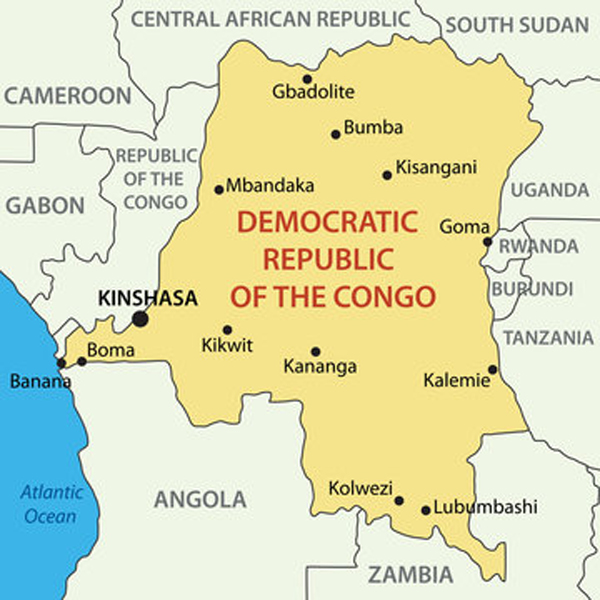
ബ്രാസാവില്ല: ആഫ്രിക്കന് രാജ്യമായ ഡെമോക്രാറ്റിക് റിപ്പബ്ലിക് ഓഫ് കോംഗോയിലെ ക്രൈസ്തവ ആരാധനാലയത്തില് എഴുപത് ക്രിസ്ത്യാനികളെ ശിരഛേദം ചെയ്ത നിലയിൽ കണ്ടെത്തി. രാജ്യത്തിൻ്റെ വടക്ക് കിഴക്കൻ ഭാഗത്ത് ക്രൈസ്തവ വിശ്വാസികൾക്ക് നേരെ നടന്ന ഏറ്റവും പുതിയ ആക്രമണമാണിതെന്ന് വിവിധ പ്രാദേശിക മാധ്യമങ്ങള് റിപ്പോര്ട്ട് ചെയ്യുന്നു. ഫെബ്രുവരി 13 വ്യാഴാഴ്ച പുലർച്ചെ 4 മണിയോടെ, ഇസ്ലാമിക് സ്റ്റേറ്റ്സുമായി ബന്ധമുള്ള സഖ്യകക്ഷികളായ ഡെമോക്രാറ്റിക് ഫോഴ്സിലെ (എഡിഎഫ്) തീവ്രവാദികളാണ് ആക്രമണം നടത്തിയത്.
എഡിഎഫ് തീവ്രവാദികൾ ഗ്രാമം വളഞ്ഞു 50 ക്രൈസ്തവ വിശ്വാസികളെ കൂടി പിടികൂടി. പിന്നീട് ഇരുപതു പേരെ കൂടി ബന്ദികളാക്കി 70 പേരെയും കസങ്കയിലെ പ്രൊട്ടസ്റ്റൻ്റ് ആരാധനാലയത്തില് കൊണ്ടുപോയി ദാരുണമായി കഴുത്ത് അറത്ത് കൊലപ്പെടുത്തുകയായിരിന്നുവെന്ന് വിവിധ മാധ്യമങ്ങള് റിപ്പോര്ട്ട് ചെയ്യുന്നു. ക്രൈസ്തവ നരഹത്യ അരങ്ങേറി ദിവസങ്ങള്ക്ക് ശേഷമാണ് പുറംലോകം വാര്ത്ത അറിയുന്നത്. സുരക്ഷ സാഹചര്യം താറുമാറായ പശ്ചാത്തലം കണക്കിലെടുത്ത് സംഭവത്തിന് മുന്പ്, പള്ളികളും സ്കൂളുകളും ആരോഗ്യ കേന്ദ്രങ്ങളും അടച്ചിരുന്നുവെന്ന് കോംബോ പ്രൈമറി സ്കൂൾ ഡയറക്ടർ മുഹിന്ദോ മുസുൻസി വെളിപ്പെടുത്തി.
രാജ്യത്തിൻ്റെ വടക്ക് കിഴക്കൻ മേഖലയിൽ എഡിഎഫ് തീവ്രവാദികൾ ഉയർത്തുന്ന ഭീഷണിയുടെ തുടർച്ചയാണ് ഏറ്റവും പുതിയ ഈ ദാരുണ സംഭവം. 2014-ൽ, നോർത്ത് കിവു പ്രവിശ്യയിലെ ബെനി പ്രദേശത്ത് സംഘം ആക്രമണം ശക്തമാക്കിയിരിന്നു. അതിനുശേഷം ആക്രമണങ്ങൾ ഇറ്റുരി പ്രവിശ്യയിലെ ഇരുമു, മംബസ പ്രദേശങ്ങളിലേക്ക് വ്യാപിച്ചു. കഴിഞ്ഞ മാസത്തിൽ മാത്രം, ബസ്വാഘ മേഖലയില് ഇരുനൂറിലധികം പേരെ സംഘം കൊന്നു. കഴിഞ്ഞ വർഷം, കോംഗോയില് 355 ക്രൈസ്തവരാണ് വിശ്വാസത്തിൻ്റെ പേരിൽ കൊല്ലപ്പെട്ടത്. മുൻ വർഷം 261 ആയിരുന്നു.
അതേസമയം 10,000 സാധാരണക്കാര് ആഭ്യന്തരമായി കുടിയൊഴിപ്പിക്കപ്പെട്ടു. ക്രൈസ്തവര് തിങ്ങി പാര്ത്തിരിന്ന നിരവധി ക്രിസ്ത്യൻ ഗ്രാമങ്ങൾ പൂർണ്ണമായും ഉപേക്ഷിക്കപ്പെട്ടു. റുവാണ്ടയുടെ പിന്തുണയുള്ള M23 വിമത ഗ്രൂപ്പാണ് സമീപകാല ആക്രമണങ്ങളില് ക്രൈസ്തവര്ക്ക് വലിയ ഭീഷണി ഉയര്ത്തിക്കൊണ്ടിരിക്കുന്നത്. കഴിഞ്ഞ വര്ഷം കോംഗോയില് ഇസ്ലാം മതം സ്വീകരിക്കാൻ വിസമ്മതിച്ചതിനെ തുടർന്ന് ഇസ്ലാമിക് സ്റ്റേറ്റ്സുമായി ബന്ധമുള്ള അക്രമികള് കത്തോലിക്ക വിശ്വാസികളെ കൊലപ്പെടുത്തിയ സംഭവത്തെ അപലപിച്ച് ഫ്രാന്സിസ് പാപ്പ രംഗത്ത് വന്നിരിന്നു.
കടപ്പാട് :പ്രവാചക ശബ്ദം
Christians in DRC have again been left reeling after a heinous act of violence that has left 70 believers dead. Please pray for our brothers and sisters in the country as they face escalating persecution.
Seventy Christians have been found beheaded in a church in the Democratic Republic of Congo (DRC), in what’s the latest devastating attack on believers in the north east of the country.
According to field sources, at around 4am last Thursday (13 February) suspected militants from the Allied Democratic Forces (ADF) – a group with ties to so-called Islamic State (IS) – approached homes in Mayba in the territory of Lubero, saying: “Get out, get out and don’t make any noise.” Twenty Christian men and women came out and were captured.
Shaken by this incident, people from the local community in Mayba later gathered to work out how to release those held captive. However, ADF militants surrounded the village and captured a further 50 believers.
All 70 of those kidnapped were taken to a Protestant church in Kasanga where they were tragically killed.
Muhindo Musunzi, director of the Kombo primary school [which belongs to the CECA20 church], says that prior to this incident, churches, schools and health centres had all shut their doors because of the chaotic security situation. “We had to move all activities towards Vunying,” he said.
Field sources report that, until Tuesday 18 February, some families had not been able to bury their dead because of insecurity in the area. Many Christians have now fled the area for their safety.
“We don’t know what to do or how to pray; we’ve had enough of massacres,” says an elder of the CECA20 church. “May God’s will alone be done.”
Rise in violence and internal displacement
This latest awful incident is a continuation of the escalating threat posed by ADF militants in the country’s north east region. In 2014, the group intensified attacks in Beni territory in North Kivu province, and since then attacks have spread to the territories of Irumu and Mambasa in Ituri province, and now it’s affecting Lubero. In the last month alone, the group have killed more than 200 people in Baswagha chiefdom, according to a local news website.
This explains why DRC rose six places to number 35 in the latest World Watch List. Last year, 355 were killed for their faith, compared with 261 the previous year, whilst an estimated 10,000 were internally displaced, which is ten times more than 2023. Houses have been looted and burnt, schools relocated, churches and health facilities closed, and several Christian villages have been abandoned altogether. The recent activities of the M23 rebel group, reportedly supported by Rwanda, has added to the vulnerability of Christians.
A call to remain in prayer
“Open Doors strongly condemns this heinous act of violence against civilians and calls upon civil societies, governments and international organisations to prioritise civilian protection in eastern DRC where armed groups, such as the ADF, are operating,” says John Samuel*, Open Doors’ legal expert for the work in sub-Saharan Africa.
“The violence takes place in a context of impunity, where almost no one is held accountable,” he continues. “This massacre is a clear indicator of widespread human rights violations against civilians and vulnerable communities, often targeting Christians, perpetrated by ADF – called Islamic State affiliate.”
“We further call on the international Christian community to remain in prayer for Christians and vulnerable communities in eastern DRC,” adds John Samuel. “Pray for an end to violence and that government at all levels will diligently, impartially, and transparently address the violence and its effects. Pray for the church in Lumbero as she seeks to bring physical and spiritual assistance to the families affected.
world news
കൊതുകിനെ പിടിക്കുന്നവര്ക്ക് പാരിതോഷികം പ്രഖ്യാപിച്ച് ഫിലിപ്പിന്സിലെ നഗരം.
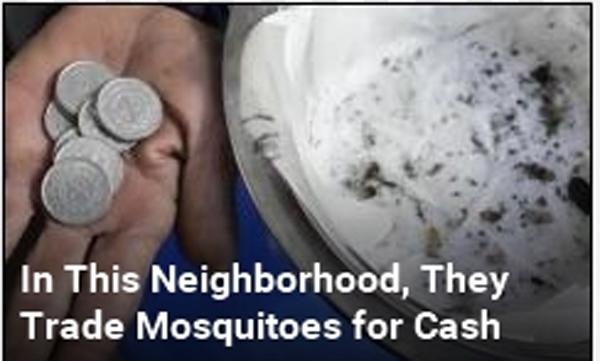
കൊതുകുകളെ ജീവനോടെയോ കൊന്നോ എത്തിക്കുന്നവര്ക്ക് പാരിതോഷികം പ്രഖ്യാപിച്ച് ഫിലിപ്പിന്സിലെ മനിലയിലെ പ്രാദേശിക ഭരണകൂടം. ഡങ്കിപ്പനി നഗരത്തില് വ്യാപകമാകുന്ന പശ്ചാത്തലത്തിലാണ് പ്രഖ്യാപനം. കൊണ്ടുവരുന്ന അഞ്ച് കൊതുകിന് ഒരു പെസോ വീതമാണ് പാരിതോഷികമായി നല്കുക. ഇത്തരമൊരു അപൂര്വ പ്രഖ്യാപനം കൊതുകുപരത്തുന്ന പകര്ച്ചവ്യാധികളെ തടയേണ്ടതിന്റെ പ്രാധാന്യം ജനങ്ങളെ ഓര്മിപ്പിക്കുമെന്നും കൊതുകു നശീകരണ പ്രവര്ത്തനങ്ങള് ഊര്ജിതമാക്കുമെന്നും വില്ലേഡ് ക്യാപ്റ്റന് കാര്ലിറ്റോ കെര്നല് പറഞ്ഞു.
Sources:usmalayali
Authorities in one of the Philippines’ most densely-populated urban centres are offering a cash reward for mosquitoes in an attempt to stop the spread of dengue.
Carlito Cernal, village chief of Barangay Addition Hills in central Manila, announced the bounty of one peso (less than two US cents) for every five mosquitoes.
While news of the bounty has provoked scorn on social media, Mr Cernal has defended it as necessary for the community’s health.
The move follows a recent spike in cases of dengue, which is spread by mosquitoes, in the Philippines.
The programme, which will run for at least a month, was started after two students in Mr Cernal’s neighbourhood died from the disease.
The bounty applies to all mosquitoes – dead or alive – and their larvae, Mr Cernal added. Live mosquitoes will be exterminated using ultraviolet light.
A total of 21 people have already claimed their reward, bringing in a total of 700 mosquitoes and larvae so far, he told the BBC.
The bounty drew swift ridicule after it was announced late on Tuesday.
“Mosquito farming is coming,” one social media comment read. “Will a mosquito get rejected if it has only one wing?” read another.
The Philippines’ Department of Health (DOH) told the BBC that it “appreciates the good intentions of local government executives to fight dengue”.
It declined further comment, however, when asked if catching mosquitoes in exchange for cash is an effective way of stopping dengue.
“We urge all concerned to please consult and coordinate with their local health officers or the DOH regional office in their area for evidence-based practices that are known to work,” it said.
Mr Cernal said he was aware that the bounty had been bashed on social media, but added: “This is one of the biggest and most dense areas. We have to do something to help the local government.”
He pointed out that local health authorities recorded 44 cases of dengue in the community during the most recent surge of infections.
Barangay Addition Hills is home to nearly 70,000 people, crammed into a 162-hectare patch at the heart of the capital, Metro Manila.
Mr Cernal said the bounty was meant to supplement existing measures such as cleaning the streets and preventing the build-up of water where dengue-carrying mosquitoes lay their eggs.
-

 Travel9 months ago
Travel9 months agoയാക്കൂസ കരിഷ്മ:ഓല സ്കൂട്ടറിനേക്കാൾ വിലക്കുറവിൽ കുഞ്ഞൻ കാർ; സിറ്റി യാത്രകൾക്ക് ഇനി ഇവൻ മതിയാവും
-

 Movie3 months ago
Movie3 months agoFor KING + COUNTRY Stars’ Big Plan to Bring Message of Jesus, ‘Redemption of Humanity’ to People Across America
-
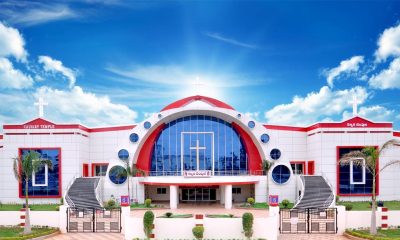
 National12 months ago
National12 months ago300,000-Member Indian Church to Plant 40 More Megachurches
-

 National12 months ago
National12 months agoനെയ്തേലിപ്പടി ക്രൂസേഡിന് അനുഗ്രഹീത സമാപ്തി
-

 Tech8 months ago
Tech8 months agoചിത്രങ്ങൾ എഡിറ്റ് ചെയ്യാം; വാട്സ്ആപ്പിലെ ‘നീല വളയം’ സ്മാർട്ടാകുന്നു, കാര്യമായ മാറ്റങ്ങൾ
-

 Movie3 months ago
Movie3 months agoFor KING + COUNTRY Stars’ Big Plan to Bring Message of Jesus, ‘Redemption of Humanity’ to People Across America
-

 Movie11 months ago
Movie11 months agoActor Ryan Phillippe ‘Craving’ Relationship With God After Movie About Christian Missionary
-

 Articles9 months ago
Articles9 months ago8 ways the Kingdom connects us back to the Garden of Eden







